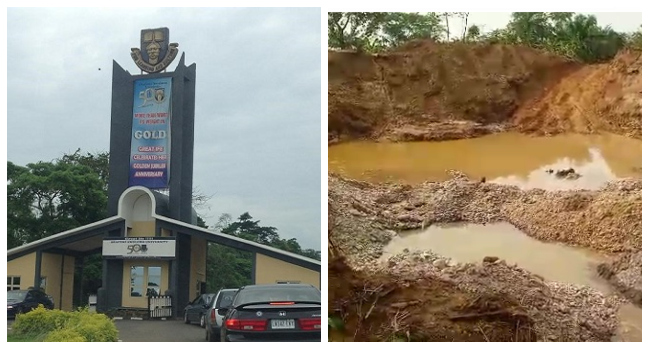A walk through an untarred path towards Ede Road, beside Cooperative Hostel (students hostel) before Damico, revealed another side of life where illegal miners selfishly feast and thrive on Nigeria’s commonwealth inside the prestigious Obafemi Awolowo University (OAU).
Except on a closer look, one could easily be deceived to assume a road construction work was ongoing in the area.
But as we moved to record activities on the land, our reporter was able to capture the face of one of the miners who sat crossed-legged on a bamboo seat by the roadside.
As the miner sat, engrossed in conversation with a mystery person over the phone, we spotted a sandy path right beside him leading into the mining site.
Some thick tipper lines were seen drawn deep into the sandy soil, and right behind the trees were piles of sand that could be seen from the tarred road.
Even though we could not move into the sight on the first visit for fear of being harassed, we later captured another miner trying to cut down some tree branches to cover up the path leading to the site as soon as he suspected he was being watched.
One of the primary concerns associated with illegal mining is its devastating impact on the environment. Unregulated mining operations often involve the use of harmful chemicals such as mercury and cyanide, which are used to extract minerals like gold and lead. These chemicals can leach into nearby water sources, contaminating rivers and groundwater, and posing serious health risks to both humans and wildlife (students and staff in this case). The indiscriminate use of heavy machinery and explosives further exacerbates environmental degradation, causing deforestation, soil erosion, and habitat destruction.
Surprisingly, Channels Television soon learnt that there were other mining sites right inside the campus of the university.
According to investigation, another site is located at Road 7 which plays host to a couple of buildings, including the junior staff quarters of the university. Another invasion we learnt, takes place at the University Teaching and Research farm.
A source close to the matter told our reporter that precious stones were also being mined inside the river along the teaching hospital complex.
“But I cannot ascertain what they are mining at other locations,” one of our sources who begged not to be named told our reporter.
“Road seven is not the only mining site here. There are many others too. An invasion is also happening at the university teaching and research farm. The mining site there is so deep,” the source added.
Olanrewaju also confirmed the visit of EFCC to the university last Thursday.
“They came uninvited concerning the illegal mining taking place here. They are going to carry out their independent investigation and get back to us,” he added.
Spokesperson for the EFCC, Dele Oyewole confirmed ongoing illegal mining in the University’s premises.
“We were they for an on-site assessment of the place, and we were able to confirm that mining activities are ongoing there.
“Some of the miners claimed that they were issued the licences by the federal government, and we are currently investigating their claim.
“Currently, the case is of top priority to us at the EFCC, and we are making sure to do a thorough investigation of activities there. We assure the public that as soon as we are through with our findings, details will be made open,” he said.
Minister of Mines Keeps Mum
Following confirmation of the ongoing unauthorised mining by the school’s management, our correspondent put a call; likewise messages across to the Minister of Solid Minerals Development, Dele Alake. The minister, however, did not pick up his call. He did not also respond to our messages.
This is as the minister last Thursday, unveiled a 2,200-strong Mines Marshal to smoke out illegal miners and all those who flout the nation’s mining laws, in fulfilment of a major plank of his 7-point agenda, to create new security architecture to secure mining sites across the country.
Sadly, OAU is not the first to witness the invasion of such illegal miners.
IBADAN
It would be recalled that at about 7.44 pm on January 16 this year, an explosion was reported in the Bodija area of Ibadan, the Oyo state capital, killing two persons, and injuring 77 others, with scores of damage to properties recorded.
The state governor, Seyi Makinde confirmed that the explosion was caused by illegal miners who stored explosive devices in one of the buildings.
ZAMFARA
Illegal mining activity is also a growing socio-economic challenge in Zamfara state especially in Bukkuyum and Anka local government areas. Usually carried out mostly by local artisans, and traders from neighbouring countries, as well as Russia and China, Zamfara’s richly-deposited gold is being largely explored and stolen by illegal miners.
BENUE
Benue State is one of the states rich in solid mineral deposits. It is claimed that some of the mineral deposits found in the state include gold, coal, lead–zinc, barites, limestone, gypsum, clay, phosphate, glass sand, fluorspar, salt, ironstone, uranium, sulphur, graphite, cassiterite, manganese, mica among others.
Apart from Owupka where miners are claimed to have been licenced by the federal government, activities in most of the communities in the state are undertaken by artisanal and small-scale mines that do not have licenses to carry out extraction practices in the communities.
Other states such as Plateau, Nasarawa, Taraba, Borno, Niger, Kwara, Kano, Kebbi, Bauchi, and Kaduna are also reported to currently experience their share of illegal mining.
Source: Channels Television
